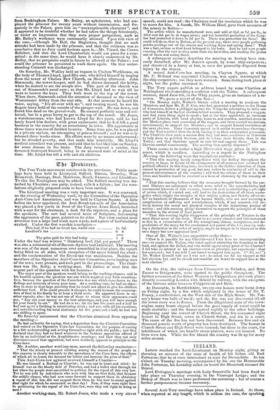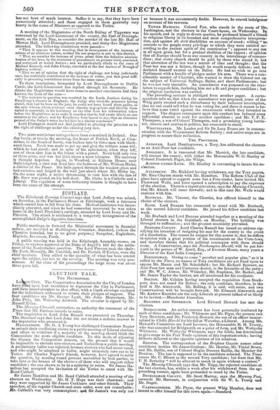IRELAND.
Letters reached the Lord-Lieutenant on Monday night, giving so alarming an account of the state of health of his father, old Earl Fortescue, that be at once determined to start for Devonshire. At ten o'clock on Tuesday morning, accompanied by his son the Honourable John Fortescue, his Lordship sailed on board the Shamrock steamer for Bristol.
Lord Ebrington's marriage with Lady Somerville had been fixed to take place on Thursday evening, in the Viceregal Lodge ; and the Bishop of Meath was to have performed the ceremony : but of course a further postponement became necessary.
Several Anti-Tory meetings have taken place in Ireland. At these, when reported at any length, which is seldom the case, the speaking
has not been of much interest. Suffice it to say, that they have been numerously attended ; and those engaged in them generally very hearty in the cause of Ministers as opposed to the Tories.
A meeting of the Magistrates of the North Riding of Tipperary was convened by the Lord-Lieutenant of the county, the Earl of Donough- more, on the 25th May, to consider the murder of the late Mr. Hall of Merton Hall. Lord Donoughmore presided, and thirty-five Magistrates attended. The following resolutions were passed-
" That it appears to this meeting. that in consequence of the increase of crimes of an atrocious nature, neither life nor property is safe in this district. " That we consider the increase of crime arises from the defective adminis- tration of the laws, by the remission of punishment on persons tried, convicted, and sentenced at recent Assizes ; and we particularly allude to the cases of Michael Kennedy and John Cleary, convicted at the last Assizes of Nenagh of highway rubbery. " That we are of opinion that the right of challenge not being judiciously used, has materially contributed to the increase of crime, and that great diffi- culty in procuring convictions arises from the same cause."
To these resolutions, forwarded by Lord Donoughmore to Dublin Castle, the Lord-Lieutenant has replied through his Secretary. He thinks the Magistrates would have come to another conclusion had they known the facts of the case- " The sentence in question was remitted by the Lords Justices during his Excellency's absence in England ; the Judge who tried the prisoners having stated, that had he been on the jury, he could not have found them guilty, as the only witness whose evidence went directly to4mplicate and identify them varied so materially iu his testimony on the trial from his information taken before the Magistrates, as to make it manifest that he had sworn falsely on one occasion or the other; and his Excellency feels bound to say, that an attentive perusal of the Judge's notes has led him to a similar conclusion."
Lord Ebrington would not feel justified in altering the practice as to the right of challenge under the existing jury-law.
Two more murderous outrages have been committed in Ireland. One day lately, at two in the morning, the house of Patrick Nevil, at Clon- mines, iu the South of Kerry, was broken into by three men with black- ened faces. Nevil was made to get up and give the robbers some 401., which he had saved ; and in spite of his submission, when they left, one of them shot him in the breast with a pistol. Nevil held only two or three acres, and was but little above a mere labourer. His recovery is thought hopeless. Again, in Wexford, at Killeton House, near Ballylongford, a shot was fired into the bedroom of Mr. William Hicke, a Justice of the Peace. Six balls passed through the window-glass and bed-curtains, and lodged in the wall just above where Mr. Hicke lay. On the same night, a notice threatening to visit him with the fate of Itr. Brew was posted on his hall-door. Mr. Hicke is a Catholic and a Liberal. The expulsion of some refractory tenants is thought to have been the cause of the attempt.



























 Previous page
Previous page